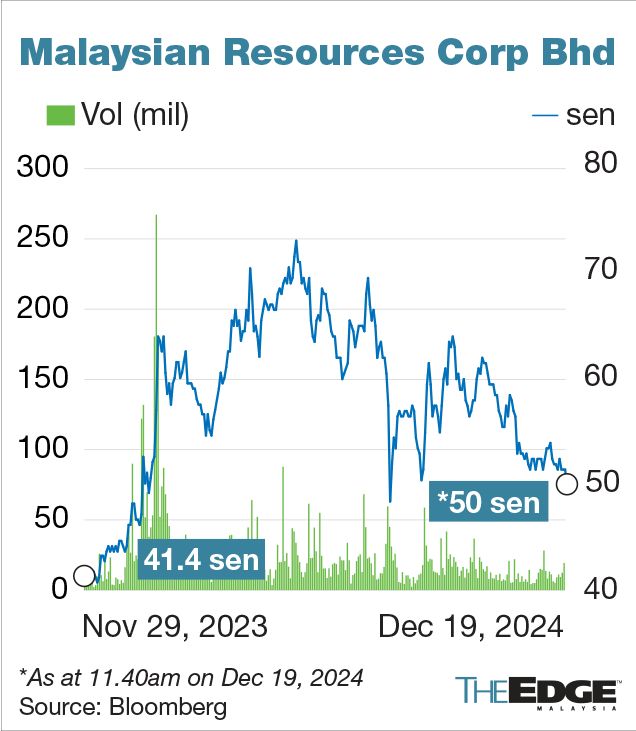
KUALA LUMPUR (Dec 19): Shares of Malaysian Resources Corporation Bhd (KL:MRCB) slipped to a four-month low in early trade after the group was said to have withdrawn from the Berjaya Group-led consortium vying for the Kuala Lumpur-Singapore high-speed rail (HSR) project.
MRCB shares fell 2.5 sen or 5% to 49 sen, valuing the group at RM2.2 billion, with 10.6 million shares done. In August, the counter closed at its lowest level at 48.5 sen.
Berjaya announced in a statement on Wednesday that MRCB has withdrawn from the consortium to pursue other strategic opportunities. MRCB has yet to comment on the matter.
The Berjaya-led consortium was among three shortlisted for the HSR project, according to a report by The Edge Malaysia in its March 18-24, 2024, edition. The other two shortlisted bidders are the YTL Construction Sdn Bhd-SIPP Rail Sdn Bhd consortium and a Chinese consortium reportedly led by state-owned China Railway Construction.
The Berjaya-led consortium initially included MRCB, IJM Construction Sdn Bhd, Berjaya Rail Sdn Bhd, Keretapi Tanah Melayu Bhd (KTMB), IJM Corp Bhd (KL:IJM), and technical partners Deutsche Bahn, Hitachi Rail, and Hyundai Rotem.
Following MRCB's withdrawal, the consortium now comprises IJM Construction, Berjaya Rail, KTMB, IJM Corp, and the technical partners.
Berjaya Rail is 70% owned by Berjaya Land Bhd (KL:BJLAND) and 30% by Tunku Tun Aminah Sultan Ibrahim, the daughter of the Malaysian King.
The HSR project has been awaiting government approval since an information request exercise was concluded in January 2024.
Transport Minister Anthony Loke stated that the Cabinet is expected to make a policy decision by the end of December or early January before resuming talks with Singapore.
MRCB's stock has seen a rally this year but has recently declined.
Seven research houses cover the stock, with five 'hold' and two 'buy' recommendations.
The consensus 12-month target price is 69 sen, implying a potential 40% gain.
MRCB currently trades at a 16.1 times trailing price-earnings (P/E) ratio, considered mid-range among its peers.

